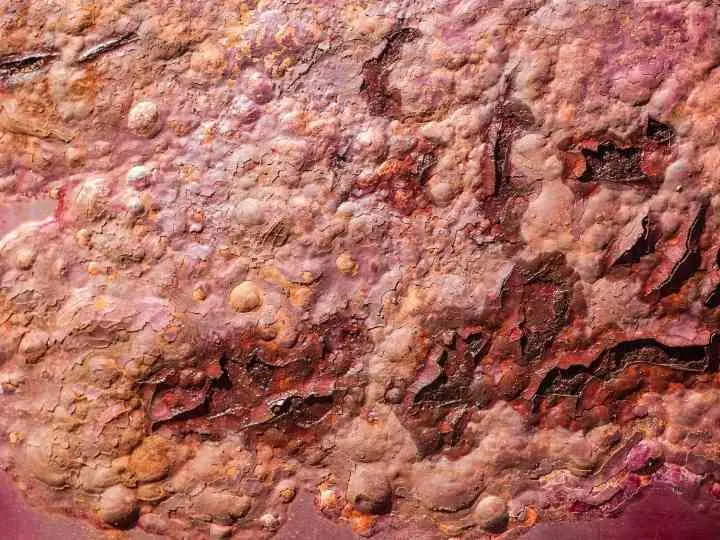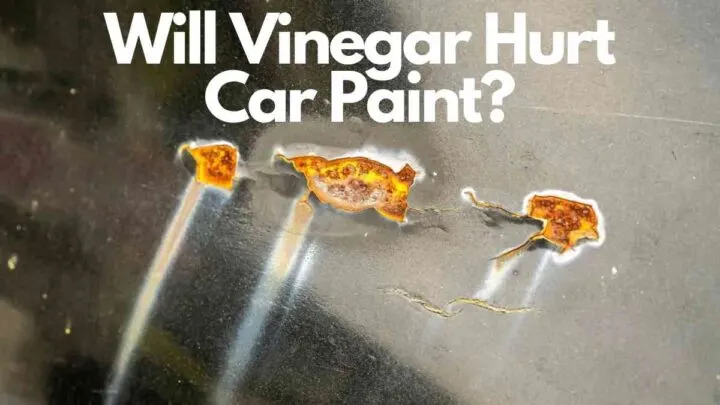When cleaning your car, you may not want to buy something at the store.
Instead, you may opt to use the home concoction of vinegar and water.
Although used for many things around the house, you may have some doubts about using it on your car. Will vinegar hurt car paint? Here’s what you should remember.
While vinegar is safe to use on all surfaces for the interior of your car, it’s best if you use something else that’s made specifically for your car’s exterior. If you use vinegar to clean the outside of your vehicle, it will most likely damage your paint job and leave the paint looking dull.
The reason for this is that most types of vinegar, especially white vinegar that is used for most cleaning chores, are very acidic in nature.
Because of this, even if you wipe off the vinegar immediately after applying it to car paint, the acidity will allow it to eat into the car paint, which is what will make the paint appear very dull.
If you think vinegar will harm your car’s paint when it is diluted with water, it can do even more damage if you spray it on your car’s paint when it is at full strength.
Should you make this mistake, it will do more than just leave you with a dull paint job.
Instead, the vinegar will actually burn into your car’s paint, resulting in corrosion.
Is White Vinegar Safe to Use on Car Paint?
No, white vinegar is not safe for you to use on car paint. Along with the likelihood that it will dull your car’s paint or even actually corrode it, there is also the chance you will come away with paint that has scratch after scratch etched into it.
Unlike car shampoos or other types of car detailing products that are made specifically to be used on car paint, white vinegar does not possess the same lubrication properties.
As a result, when you are hand washing your car and using white vinegar to do so, it will be much more abrasive than you imagined.
Thus, with every stroke of the cloth or paper towel you make, there is a good chance you will be leaving behind a scratch.
Does Vinegar Damage Car Windows?
While we don’t recommend you use vinegar to clean your car’s paint, it is generally fine to use it to clean your car’s windows.
Actually, white vinegar is widely regarded as being the best thing you can use to clean windows since it leaves no streaks and is great at cutting through dirt, dust, and grime.
However, if you choose to use it on your car windows, we do have a suggestion you should keep in mind.
While the vinegar won’t damage your car windows, it may cause damage to the non-glass areas around the windows. These can include the silver backing on mirrors, framework around the car windows, and other nearby areas.
If you decide to give vinegar a try on your car windows, we have two things for you to remember.
First, spray the vinegar directly onto a cloth, rather than the glass itself.
Second, avoid spraying too much vinegar on your cloth, since doing so may cause it to drip and fall onto areas around the windows that could become damaged.
Is Vinegar Bad for Tires?
Though we know having clean, shiny tires will make practically any car look that much better, we strongly urge you to not use vinegar in an effort to have great-looking tires.
Just as the vinegar will eat away at your car’s paint and cause damage to the trim around windows, it can also cause substantial damage to your car tires, especially if you use vinegar that has not been diluted with water.
When you spray vinegar onto tires, it will immediately begin to eat away at the rubber, much in the same way it would on much harder materials such as stone.
As a result, your tires can begin to degrade, potentially making them unsafe and putting you at greater risk of having an accident.
Rather than using vinegar to clean your tires, we suggest you try the tried and true combination of soap and water. If you like, a combination of soap and baking soda is also great to use on tires.
Or if you prefer, you can find plenty of tire cleaning products at any auto parts store.
Can You Use Vinegar to Clean Your Car?
Well, you’ve probably figured out by now that you can use vinegar to clean your car, so long as you use it only on your car’s interior and the windows.
Recognized as one of the best cleaning agents, vinegar can easily work on car seats, dashboards, and other parts of your car to get it clean and fresh.
But as we noted earlier, be careful not to spray it directly onto any part of your car, since you may wind up getting vinegar on something for which it was not intended.
However, remember that even when you are using vinegar on a surface where it is safe, always try to wipe down the surface with the vinegar and then dry it off as fast as possible.
Since vinegar is acidic, letting it linger a bit too long could result in a dull finish or other damage.

Is Vinegar Used in Car Detailing?
While we don’t recommend that you as the average person try using vinegar to clean the outside of your car, it is a fact that many professional car detailers do in fact use vinegar now and then.
Often referred to as a “sour rinse,” this cleaning method involves detailers using a diluted vinegar solution on a vehicle. Most often, this technique is used when detailers are trying to remove tar or tree sap from the paint of a vehicle.
How Much Acid is in Vinegar?
When you think of using anything on your car that contains acid, you probably shudder at the thought of all the things that could possibly go wrong.
However, even though vinegar does have acidity levels that make it unsafe to use on your car paint, tires, and other types of surfaces, its acidity levels are actually pretty low.
Overall, standard white vinegar used for most cleaning purposes has acidity levels ranging from as low as four percent to as much as 18 percent.
While 18 percent may sound very high, it’s really not, which is why using a diluted solution of white vinegar and water works so well on most household cleaning projects.
If you find yourself running low on vinegar and are looking for something you think may be a suitable substitute, don’t choose that bottle of lemon juice you may find in your refrigerator.
Even though many household cleaning products are scented with lemon, trying to use lemon juice to clean your car could be a disaster.
In fact, lemon juice is actually even more acidic than vinegar, meaning it could do even more damage to your car’s paint, tires, and other parts.
To sum up, vinegar can be used to safely clean your car’s interior and glass areas. But when you’re ready to get your paint and tires looking their best, use soap and water or products designed specifically to clean these parts of your car.
